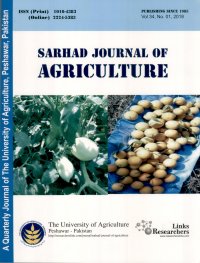Assessment of Yield Contributing Quantitative Traits in Upland Cotton (Gossypium hirsutum)
Assessment of Yield Contributing Quantitative Traits in Upland Cotton (Gossypium hirsutum)
Samaria Nisar1, Tariq Manzoor Khan1, Muhammad Ahsan Iqbal1, Rahmat Ullah2, Muhammad Asim Bhutta3*, Saghir Ahmad3, Amna Bibi3, Hafeez ur Rehman4, Umar Farooq4 and Muhammad Zubair Ishaq5
ABSTRACT
Pakistan is listed among 5th top cotton producer and consumer countries. In Textile and agricultural economics, cotton plays a significant role. Improving the level of mechanization and the scale of cotton production in Pakistan is an urgent need of the hour. A thorough examination of F2 populations may reveal important information for the development of various breeding programmes. This study was on F2 populations, derived from four parents of upland cotton, i.e. CRIS-134, VH-329, IUB-222, CIM-240 which were sown in the Plant Breeding and Genetics section, University of Agriculture, Faisalabad; Pakistan, during the normal growing season of cotton. A Randomized Complete Block design with three replications was used for the study. Plant height (PH), boll weight (BW), bolls/plant (BP), ginning out turn (GOT percent), hundred seed weight (100SW), yield/plant (YP), fiber fineness (FF), fiber length (FL), and fiber strength (FS) all revealed substantial variation in the analysis of variance (FS). The goal of this research was to quantify variability and conduct a correlation analysis to see potential for selection in the F2 population. Plant height (cm) was found to have a positive relationship with boll weight, bolls/plant, fiber strength, fiber length, and fiber fineness when the correlation coefficient was calculated. The bolls/ plant revealed a positive correlation with the boll weight and the production of seed cotton. Boll weight revealed a positive correlation with fiber length and ginning gout turn. Fiber length this positively associated with fiber strength. Correlation analysis showed that100 seeds (g) weight was positively linked to fiber fineness, yield per plant (g) and GOT. It is investigated from the data Genotype CIM-240×CRIS-134 had maximum yield and genotype CRIS-134×IUB-222 maximum fiber strength and proved as best for the selection in future breeding.
To share on other social networks, click on any share button. What are these?








